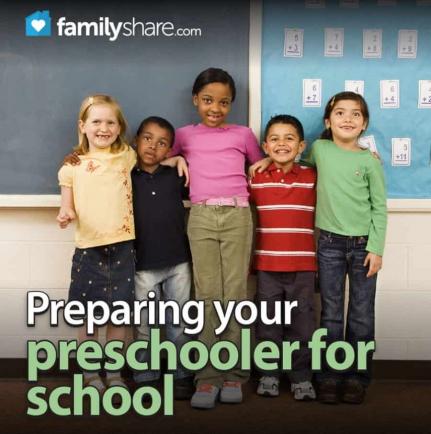
In Kevin Henkes' book, Wemberly Worried, the title character, Wemberly worries about everything. However, her biggest worry is about starting school. Beginning school is such a huge step for young children, signaling their entry into a wider and more independent world. Fortunately all five of my children entered kindergarten without worries. Although each of them has their own unique personality, each was excited to begin their "big"� school adventure. I would like to share some of the ideas I think helped make this transition one in which they looked forward to the adventure instead of fearing the unknown.
1. Independence
It is important for children to have learned to function on some level of independence before they begin school. Obviously you will not be there to help use the restroom, button, snap or zip clothing, etc. So begin early to teach them how to care for themselves. This ability to do things for themselves will also be a huge confidence booster.
Try not to hover over every task they attempt to do. I remember one little girl coming to my daughter's kindergarten class, her pigtails all askew. Her mother told us how proud she was of doing her own hair. So she didn't look perfect, but she was happy.
A sense of independence will help your child be confident when you are not by their side. Let them have play dates with other children where you do not remain with them the entire time. Knowing they have been on their own before helps them to transition to a school day without your presence. My youngest son began kindergarten this fall. His teacher wisely did not have parent helpers in the classroom for the first few weeks. This enabled each child to feel comfortable in the classroom all on their own.
2. Early Education
Each of my children participated in some type of early education, whether it was a formal preschool, a community center preschool group or a co-op with other parents. These types of groups allow children to work on the independence mentioned above, as well as group skills. These include sitting still with a group, listening to a teacher, sharing and following a classroom schedule. When I did a co-op group each mother tried to keep the schedule somewhat similar with an opening activity, calendar and weather time and circle time. This helps children to prepare for the similar structure of formal kindergarten.
3. Work on the Basics
When my husband began kindergarten, he remembers being completely confused when the class began singing the ABC song. He had never heard it before. Kindergarten has become much more intense with more in depth teaching than ever before. Take the time to familiarize your children with the alphabet, numbers, shapes and colors. It is not a matter of having them all down pat, but just laying the foundation. Excellent ways to do this can be to play games in the car such as calling out the letters you see in signs, counting the cars or houses you pass or other games with letters or numbers. Also play games where you use colors to guess what you see, count fruits you purchase and look for shapes.
4. Read
Finally, probably the most important thing you can do for your preschooler is read to them. Reading aloud to your child helps them learn the rhythms of language, recognize that words are represented through writing and enlighten their minds. As you read, be sure to read who the author and illustrator are. Read from a variety of genres and sources. Poetry helps introduce rhyming and rhythm within language. Picture books help cement the idea that words represent concrete things in the world. Novels introduce character, plot and setting. Visit the library to find a wide range of books. Help your child understand the physical structure of the book - the front, back, spine etc. and how to treat it properly.
Reading with your children will also teach them to listen, to anticipate and to develop critical thinking skills. Ask them what they think will happen to the character next when you finish a page or a chapter.
Going to "big"� school does not need to be worrisome for you or your child. Take time to prepare your child for the big day by following these easy steps. Then you can have a worry free transition to kindergarten.

